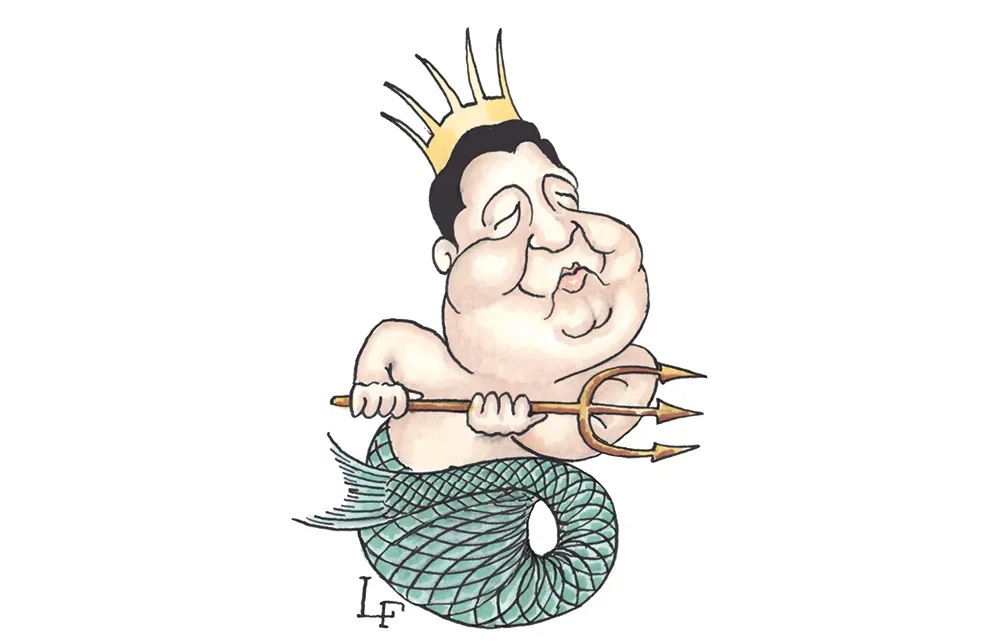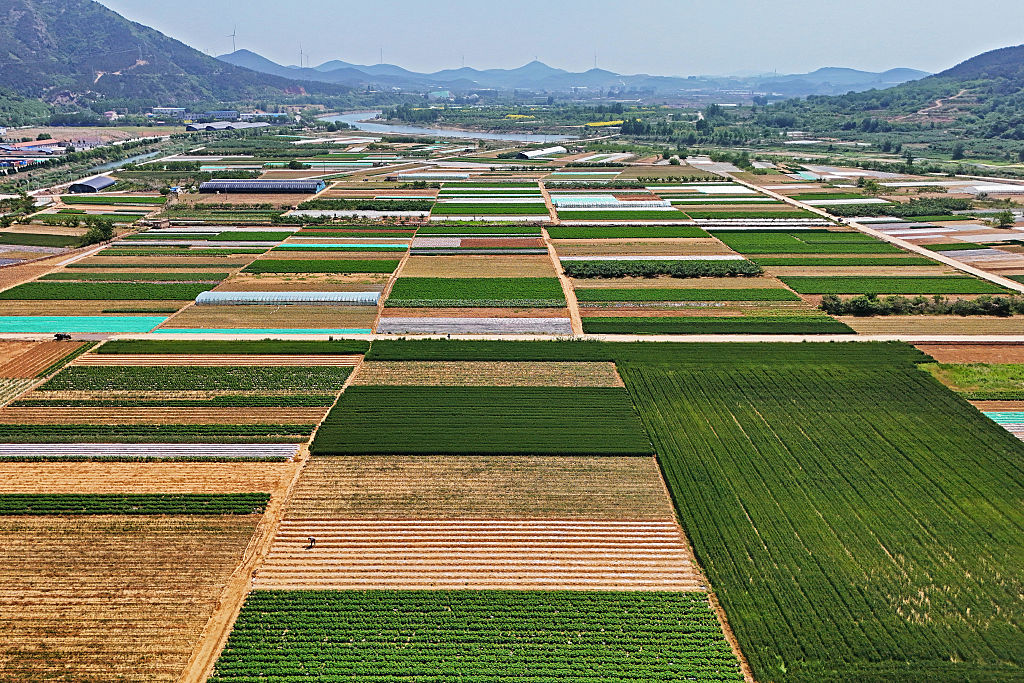In November, a communications cable between Sweden and Lithuania was damaged, almost certainly deliberately. Just hours later, the C-Lion cable, the only data link between Finland and central Europe, was severed by what authorities have diplomatically called an “external impact.” Most would call it sabotage. In a week where the Biden administration finally gave Kyiv authorization to use longer-range missiles against targets in Russia, few should think it is a coincidence.
Sir Walter Raleigh said that “whoever commands the sea commands the trade” and that “whoever commands the trade of the world commands the riches of the world — and consequently the world itself.” To understand how the English (and then the British) managed to build a global empire, these comments should be observed. Investment in shipbuilding, cannon-casting and map-making, coupled with experience at sea, enabled Britannia to rule the waves.
Raleigh’s rule still holds true today, 450 years later, as competition to control the seas intensifies once again. We live in a period of many revolutions. One of the most important is the struggle for maritime dominance. In the sixteenth century, the challenge was to find new worlds, to exploit them and to use the advantages against adversaries closer to home at a time of intense religious, political and economic rivalry. Today, as the world order creaks under the pressures of competing visions and sharpened ambitions, we’re entering a new age of tension and change.
Admiral Sir Tony Radakin, chief of the defense staff for the Royal Navy, put it bluntly. The West has entered “a new era of competition and contest that will last for decades and has the potential to be more disruptive to our economy and our security than anything Britain has experienced in modern times.” Much of that competition will be played out across the oceans and on the ocean floor. Some 90 percent of global trade today is carried by sea. As we saw during the Covid pandemic, sudden shocks can produce cost spikes. Delays in loading and unloading goods because of quarantine restrictions caused container prices to increase almost tenfold. Unexpected costs get passed to consumers; inflationary pressures throttle economic growth.
Although shipping costs have come down in recent weeks, they are way above where they were in 2023, making the “dire inheritance” that UK chancellor of the exchequer Rachel Reeves talks about worse than it otherwise might be. This time, the problem isn’t a pandemic, but pressure on global “chokepoints” — narrow bodies of water through which global trade flows. One chokepoint is the Panama Canal, which last year experienced one of its worst years in history due to a lack of rainfall. In August 2023, as many as 100 ships waited for three weeks to make a transit. Another chokepoint is the Malacca Strait in Southeast Asia, through which almost a third of all global trade passes, as well as 80 percent of Chinese imports. Then there is the Bab-el-Mandeb, at the mouth of the Red Sea, closed to most shipping since last year following Houthi attacks on vessels heading toward the Suez Canal. Ships have been diverted around the Cape of Good Hope, adding an average of seventeen days to journey times — and around $1 million in increased fuel costs. (Ironically, operations by western navies to blunt the attacks have been helpful to Chinese shipping and to Russian “dark fleet” vessels. They have largely sailed through the Red Sea unscathed.)
These chokepoints are not just important because their disruption hurts ordinary people, but because locations close to them are rapidly being militarized. In the Horn of Africa, for example, the US, China, France, Russia, Turkey, the UAE, Qatar and others have constructed or are constructing bases in sensitive locations.
The slowing down or cutting-off of trade has not been of concern since the end of the Cold War, partly because of the assumption that globalization benefited all. We should have read Adam Smith more closely. Trade, wrote Smith, can make people “effeminate and dastardly,” meaning that prosperity can make people lazy and blind to gathering storms. The headwinds are looking increasingly ominous.
At the same time as the world’s chokepoints are struggling, shipbuilding capabilities in the US and Europe have disappeared. In 1975, the US was the largest shipbuilder in the world. Today, China, South Korea and Japan build almost 90 percent of the commercial vessels constructed each year. To put that in perspective, while US shipyards have the capacity to build around 100,000 tons annually, their Chinese peers can manage 23 million tons — some 230 times more.
The Chinese dominate in almost every aspect of maritime competition. Not only does the Chinese Navy already have more vessels than the US Navy, it’s projected to grow by another fifth by the end of this decade. Chinese companies (almost all with close links to the state) also own or operate almost 100 ports around the world, and the US, unlike China, does not have a commercial fleet to speak of. All US imports and exports are carried by foreign partners — some from friendly nations, some not.
What will China do once it dominates the seas? Lu Shaye, China’s ambassador to France, recently described Taiwan as a “rebel regime” and stated that China’s civil war — which began almost a century ago — “has not yet ended.” Although some commentators have predicted an all-out assault on the island in the near future, the recent military exercises encircling Taiwan suggest a blockade would be more likely. One obvious target is the port of Kaohsiung, through which almost 60 percent of Taiwanese trade flows. These major Chinese exercises, the most recent of which was titled Operation Joint Sword 2024B, have been dummy runs for an encirclement of the island — one that would quickly strain Taiwan’s resources. Taiwan not only has high energy needs (around three times higher than the average across Asia), but it is also extremely vulnerable to disruption of its supplies — not surprisingly, since almost 98 percent of its energy is imported by sea.
Water resources are also highly stressed, partly because of changing climate patterns that have led to four major droughts over the past decade, but partly because of the water demands for the production of advanced semiconductor chips. TSMC, the global leader in this field, uses the same amount of water each day as 170,000 US households, as well as having extremely high energy demands. Blockading Taiwan would not just put the island under pressure and create a crisis in East Asia; it would have global consequences for the hi-tech sector and markets.
Maritime competition is not just about protecting or restricting the trade in goods. Undersea cables carry almost all data glob- ally, which makes them what one recent report called the “soft underbelly of the global economy.” They are vulnerable to sabotage and the disruption that follows if networks — carrying trillions of dollars of transactions every day, as well as information and communications — are compromised. Perhaps not surprising, then, that new types of vessels — such as Russia’s 22010 class intelligence ships, as well as small submarines able to disrupt undersea infrastructure — have been identified by Radakin as a key concern for national and international security. One of these, the Yantar, was spotted at the end of November sailing near critical internet and subsea power cables — and reportedly deploying drones — east of Dublin passing through the Channel; when it was escorted off the Irish Exclusive Economic Zone, it made its way west of Cork where it was spotted close to cables linking Ireland to France, as well as a network of transatlantic connections.
The seabed is also a new arena for competition, given its potential for deep-sea mining of rare earth minerals, and the rewards, strategic value and ecological damage that exploitation is likely to involve. That explains why there has been a sudden surge in nations proposing names for seabed topographical features such as sea canyons, underwater banks, ridges and reefs that are now identifiable because of 3D-mapping of the ocean floor. The aim is to “name and claim” potential natural resources, and, in some cases, to extend maritime boundaries and sovereignty claims. This is a version of the fabled “Great Game” happening in real time.
The UK’s hand is not a strong one. Attracting and retaining members of the armed forces is not easy — costing on average around ten times more to recruit than a nurse. For the Royal Navy in particular, as with the UK as a whole, the dearth of engineers coming out of universities is a critical problem, one that needs to be addressed. An indication of the problem is clear from the fact that last year, the navy saw a shortfall of more than 25 percent between its recruitment target and its intake. Beefing up the British navy’s capabilities is essential in an age of new maritime competition.
Much will rest on decisions made in Whitehall, and the speed with which they are made. All eyes are on John Healey, Britain’s new defense minister, who said shortly after the general election that the state of the armed forces was “much worse than we thought.” That will be of little comfort to Reeves. As an advisor to Louis XII of France once put it, three things are needed to either start or prevent war: money, money and yet more money.
UK defense spending will go up in the next decade. It has to. Not only to keep us safe from threats — but to keep sea lanes open, data cables intact, and goods and information flowing smoothly. Sir Walter Raleigh might be pleased that his words strike such a chord today, but he would be quick to recognize that fortunes can be won and lost in an age of change.
This article was originally published in The Spectator’s January 2025 World edition.


























Leave a Reply